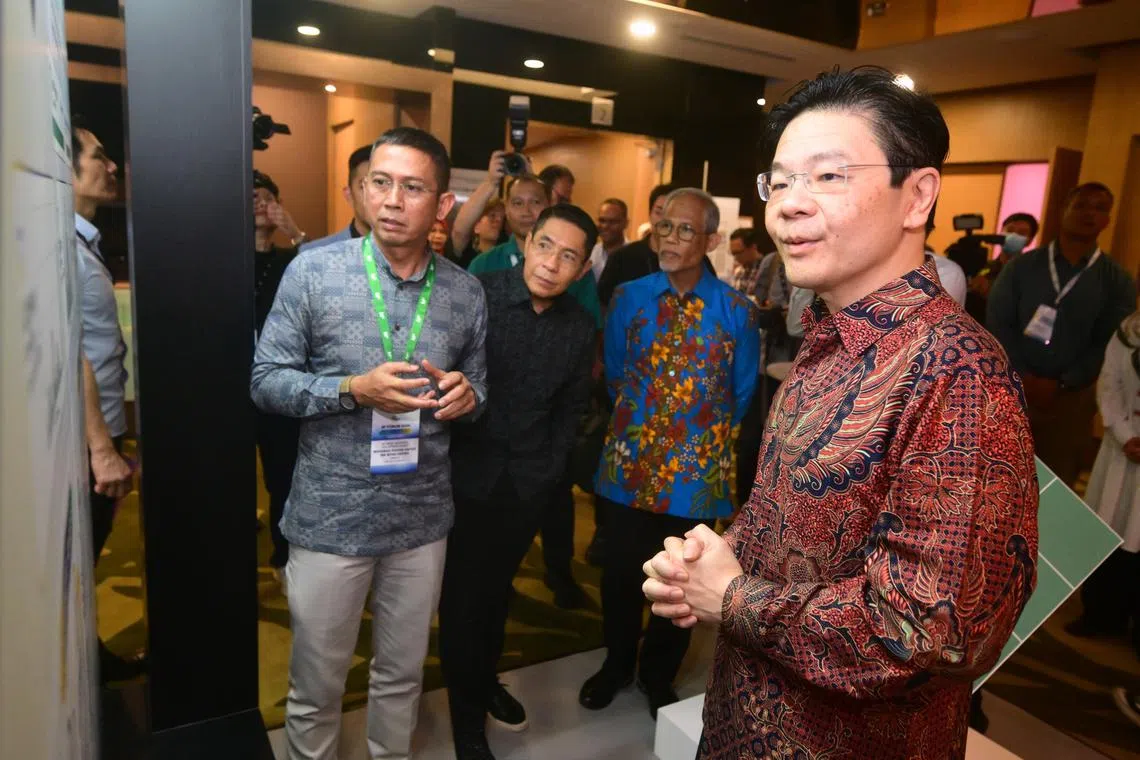New Islamic college to groom religious leaders, those who can contribute to social sector: PM Wong
Sign up now: Get ST's newsletters delivered to your inbox

PM Lawrence Wong with (from left) M³@Bedok chairman Mohamed Raihan Hafidz Mohd Rafiek, Minister in the Prime Minister’s Office Maliki Osman and Minister for Social and Family Development Masagos Zulkifli at a forum to commemorate the fifth anniversary of M3 on Nov 10.
ST PHOTO: AZMI ATHNI
Follow topic:
SINGAPORE – An upcoming Islamic college will groom not only religious leaders but also those who want to contribute to the social sector, by offering them a four-year full-time undergraduate course to major in either Islamic studies or social sciences.
The Singapore College of Islamic Studies (SCIS) will work with established institutions to deliver its programmes. These include the Singapore University of Social Sciences, Egypt’s Islamic advisory body Dar al-Ifta, the University of Jordan, and the Al-Qarawiyyin in Morocco.
Leaders of these institutions and other universities, like Al-Azhar in Egypt, will be on the SCIS advisory panel to contribute their perspectives on contemporary issues impacting Muslim minorities.
The details were announced by Prime Minister Lawrence Wong on Nov 10 at a forum to commemorate the fifth anniversary of M3, a tie-up between three key Malay/Muslim organisations serving the community.
The college, first mooted in 2016, is part of efforts to train religious scholars and teachers, also known as asatizah, to provide sound and relevant religious guidance to Muslims in Singapore’s multiracial and multi-religious context.
PM Wong had announced its name during his first National Day Rally speech in August.
In his speech on Nov 10, he said the SCIS will strengthen Singapore’s capabilities to nurture and groom a pipeline of future asatizah.
“We want them to have the knowledge and skills to provide religious guidance for our Muslim communities, but to also have an understanding of religion that’s contextualised for living in a diverse, multicultural society like Singapore, and to guide our Muslims in responding confidently to issues of the modern world,” he said.
“This is important for us in Singapore, and I believe this will help to continue to further strengthen trust between our Malay/Muslims and other communities and enable us to overcome challenges together as one united people.”
The Islamic Religious Council of Singapore (Muis), with the Government’s support, has put in place the governance structures by appointing the Mufti of Singapore, Dr Nazirudin Mohd Nasir, to head the college’s steering committee.
PM Wong also elaborated on government efforts to support the Malay/Muslim community’s aspirations to be modern and progressive, while retaining its unique culture and traditions.
These include moves to refresh cultural precincts like Kampong Glam. The Malay Heritage Centre, which is closed for redevelopment, will have new galleries and enhanced programmes, and offer an improved visitor experience when it reopens in possibly two years’ time.
With the new features, the centre can better share the stories of Singapore Malays and their contributions to the country, said PM Wong.
Another landmark in Kampong Glam, the 200-year-old Masjid Sultan, will undergo restoration works.
In Geylang Serai, the iconic Tanjong Katong Complex, frequented by Malays, was put up for sale on a 30-year lease by the authorities in October. The complex was closed for major renovation works from the second half of 2023. A successful tenderer will undertake rejuvenation of the complex while preserving its cultural value.
“When it reopens in 2029, Tanjong Katong Complex will be another key node for the Malay/Muslim community, in addition to Wisma Geylang Serai; and it will also be a vibrant destination for Singaporeans,” said PM Wong.
Self-help group Mendaki will relocate its headquarters to the new complex, while Muis will also have an office there.
Mendaki is one of the three partners in M3. The other two are Muis and the People’s Association Malay Activity Executive Committees Council.
The relocation of Mendaki will further consolidate the presence of the M3 agencies within the precinct, while also extending the community reach of Mendaki and Muis, said PM Wong.
“Both Kampong Glam and Geylang Serai are areas of special significance to our Singapore Malay community. We will work closely with the community to refresh these precincts, to make them modern and vibrant, while ensuring they retain their unique and distinctive character,” he said.
PM Wong commended M3 for the impact of its programmes in the last five years.
For example, M3 youth mentoring programmes have matched more than 1,600 mentors to 5,700 youth. There is now at least one such programme in each of the 11 M3@Towns. The M3@Towns programme creates opportunities for Malay/Muslim community members to serve in their neighbourhoods.
Today, there are some 4,000 volunteers across the M3 agencies, said PM Wong.
He added that the efforts by M3 reflect Singapore’s wider plans for the new phase of its nation building.
“Two years ago, we engaged many Singaporeans in our Forward Singapore exercise. Now we have set out a road map to chart a new way forward for ourselves and for our nation,” said PM Wong.
“We want a Singapore where every citizen will have a voice and a stake, where we can all do our part to contribute to the greater good, and we can all realise our aspirations and be the best possible versions of ourselves.”
Also at the forum were Minister for Social and Family Development Masagos Zulkifli, who is also Minister-in-charge of Muslim Affairs and Second Minister for Health, and Minister in the Prime Minister’s Office Maliki Osman, who is adviser to M3 and other Malay grassroots advisers.
Dr Maliki said the M3@Towns programme has organised 320 initiatives benefiting more than 127,000 residents.
One of the initiatives, Project Dian@M3, which aims to help families in public rental flats buy their own homes, has engaged more than 535 Malay/Muslim households.
To reach out to even more Malay/Muslim families, M3 introduced the Organisation Volunteer initiative to rally support from organisations and corporations so that their employees can contribute to society via Project Dian.
Changi General Hospital is the first such organisation volunteer. Its staff took 20 children and their parents on a fun learning journey to KidZania recently.
“As we reflect on the M3’s progress, we are filled with optimism about the future. Yet, our journey is far from over,” said Dr Maliki. “We call on organisations to lend their support to our initiatives and invite volunteers to join us in delivering last-mile services to the Malay/Muslim community.”


